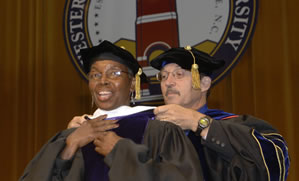The year was 1957 – the landmark Board vs. Brown was just passed making racial segregation in public places like schools, universities, restaurants, restrooms and transportation illegal. That summer a 23-year-old African-American woman, Levern Allen, attended Western Carolina University, making her the first black to not only attend WCU, but any North Carolina state college. Her connection and impact on WCU continues ever since.
Levern Allen was born and raised in Roanoke Virginia. She attended segregated Lucy Addison High School, and graduated in 1952. Allen was very involved in her high school newspaper and the Honors Society. She remembers the positive influence her teachers who were also African-American, had on her.
“It was a push for excellence,” Mrs. Allen remembers. And that push led her to WCU.
After high school Allen attended Hampton University were she received her Bachelor’s Degree in Speech Correction with a minor in English in 1956. What brought Mrs. Allen to North Carolina was a job offer she received in Mecklenburg County, but in order to teach in North Carolina she needed to get certified in Special Needs. Hampton University didn’t offer those classes, neither did Johnson C. Smith, a historically black college in Charlotte, where Allen was living at the time.
Determined to get her state certification, Allen wrote a letter to State Board of Education in Raleigh about her dilemma and they wrote back and sent her a list of Universities that were offering the courses she needed to receive her certification. Western Carolina had the three classes she was looking for, so she decided to attend WCU the summer of 1957. She applied to WCU, soon after a Special Education professor who lived in Charlotte during the wintertime, but who taught at Western in the summer, contacted her. Allen could not recall his name, but remembers he asked her to come to his office to confirm that she was indeed African-American. Also the University wanted to also confirm her identity and ensure she was not here to stir up trouble but in fact take the classes she needed.
Mrs. Hurst in the Public Relations Department at WCU in 1957 was Leven’s liaison if she had any problems or vice versa. Allen lived in Robertson Hall that summer in a room to herself. She remembers there were kids from the local high school band who were there also. During her 9-week session at WCU Allen says “there was never a problem.” She recalls always being treated well by Western Carolina University and in a time with so much racial turmoil and hostility had not problems.
When the 9 week session was over Allen was asked to stay and get her Master’s degree at Western and be the first African-American to get a degree from WCU. She declined because she was getting married the following summer and didn’t want to be so far away from her fiancé. Allen married in June of 1958, and had two children. She also continued her education earning a Master’s Degrees from the University of Maryland and George Washington University. And through years renewed her contacts with WCU.
In 1987 she was invited back to WCU by the Organization of Ebony Students, and soon after that Allen was selected to serve on the Board of Trustees at Western Carolina University from 1987-1995. Allen was also a member of the personnel committee and assisted in the hiring process of selecting Chancellor Bardo. After 1995, Allen came back to visit Western a few times for charity events, but in August 2006 it would be to receive a Honorary Doctorate from WCU.
When I informed Allen that WCU had reached 10,000 students for the first time in the Universities history she laughed and replied, “That’s quite a change from the small little teaching college.”
And it is a change. In 1957 she was the only African-American student for those 9 weeks. Today, WCU has 500 African-American students attending the university.
Levern Hamlin Allen came to Western Carolina University to fulfill a requirement to work in the State of North Carolina, but ended up leaving a huge impact on the University still felt over 50 years later.





